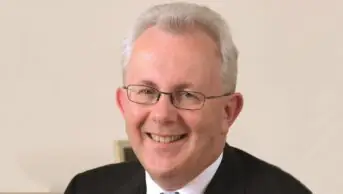
Royal Pharmaceutical Society
The Royal Pharmaceutical Society’s (RPS’s) English, Scottish and Welsh pharmacy boards held their joint summer meeting via Zoom on 28 June 2022.
Claire Anderson and Paul Bennett, president and chief executive, respectively, of the RPS, welcomed board members and observers to the meeting and extended a particular welcome to new board members, following the results of the 2022 election process.
Visions for pharmacy across the three nations
Representatives from the three nations gave updates on progress towards their future visions for pharmacy. Elen Jones, RPS director for Wales, reminded attendees that the Welsh vision had launched in 2019, aligned to the Welsh government strategy, with goals for 2025 and 2030. Jones said that RPS Wales is working with Health Education and Improvement Wales on urgent workforce issues, acknowledging that “things are tough post-pandemic”. She added that the Society is re-engaging with work towards 2025 goals, getting input from the sector through virtual and face-to-face events. “Once we have those goals we will check back with the profession, and there will be a consultation during July/August [2022] with the aim to launch in September.”
Clare Morrison, RPS director for Scotland, noted that Scotland’s vision — co-produced with the National Pharmacy Technician Group Scotland — had been launched in February 2022. On 29 May 2022, examples of best practice that underpin the vision had been shared at a large face-to-face event in Glasgow and, on 8 June 2022, the vision had been presented to MSPs at a parliamentary event. Lobbying is currently focused on more independent prescriber training, a better skill mix in pharmacy teams and the need for a single shared patient record, Morrison said.
Heidi Wright, RPS practice and policy lead for England, said that while England is at an earlier stage in the process, it is “excited to be collaborating with the King’s Fund” in developing a vision. There is a “recognition that the skills of pharmacists and wider pharmacy teams are not being used to the max for the benefit of patients”, said Wright, and noted that there were now many more roles for pharmacists. There are “pockets of good practice but these have not yet spread at pace or scale”, she added.
The English vision aims to explore where pharmacy can be in ten years’ time and how to develop this, Wright said, adding that the “key to that is the development of implementation guidance that will sit alongside the vision document”. The Society will go out to consultation on the contents of the vision over the summer, with roadshows during September and “deeper dives with specific sectors”. The King’s Fund has been developing a literature review to be published shortly, Wright said, and invited pharmacy teams to send their examples of good practice to the RPS England email address.
Supervision and strengthening pharmacy governance
Jones asked board members to feed back on a draft, three-nation position statement on strengthening pharmacy governance. The draft paper was produced following events held in March 2022 to canvas member views on whether changes were necessary to supervision legislation and, if so, what changes were needed. The draft paper posits that some changes are needed to current legislation, and sets out eight principles.
Mary Evans, English Pharmacy Board (EPB) member, said that “supervision was set up a long time ago for a very different service”, and added that “we need a complete review of what this means and what we are trying to achieve, and I am not sure we can do that in the current framework. We are now doing a lot more clinical work”.
In reference to the first principle — that “pharmacists should be accessible, approachable, and available” — Cheryl Way, chair of the Welsh Pharmacy Board, said that, in terms of wellbeing, it may need “something underpinning it saying: available within a reasonable time, for example, by appointment on occasion. We need to manage the expectations of the public”.
Jones thanked board members for some “great comments about additions and changes”, and said the draft would be updated and then shared around the three boards “to get to a point of sign-off”.
Alison Strath and Bruce Warner, chief pharmaceutical officer for Scotland and deputy chief pharmaceutical officer for England, respectively, then joined the meeting to further discuss thoughts around supervision. Warner noted that discussion around changes to supervision “needs to be seen within the context of a lot of changes we are going to see over the next five plus years, especially that new graduates will be prescribers from 2026”.
Warner said: “Interoperability of systems, funding models, capacity and skill mix, patient acceptance, scope of practice and clinical support available to people, accountability and responsibility around opening and closing episodes of care — all these impact decisions made around supervision, and it is within that context we need to look at supervision.”
Strath said: “For me, it’s about thinking about how you determine scope of practice — ensuring we have checks and balance in the system to allow people to innovate and move forward but also step out of the tram lines.”
Brendon Jiang, EPB member, said that while “any pharmacist who wants to be an independent prescriber should be able to access training — but there is a real risk of not having the support of DPPs/DMPs [designated prescribing practitioner/designated medical practitioner]. I would love to train [as a DPP], but the ability to spend a lot of time supervising is difficult to explain to employers”.
Martin Astbury, vice chair of the EPB, said the “biggest logjam we see in community pharmacy is not having enough ACTs [accuracy checking technicians], and where there are, they are in some cases not being able to run the assembly function. That’s the biggest thing that frees up everything”.
Asked about timelines towards supervision legislation changes, Warner said that “2026 gives us a point in time to work for. There is legislation going through parliament, and a debate in the House of Lords today. It will go to privy council and is likely to be approved in autumn. The 2026 date is a key one for me; if we get all our ducks lined up before then we will be doing well and that’s what we need to be aiming for”.
Pharmacists’ Defence Association Safer Pharmacies Charter
Paul Day, director of the Pharmacists’ Defence Association (PDA) and PDA Union, said that the PDA published its Safer Pharmacies Charter five years ago. At the time, he said, the RPS was asked to endorse it and “that invitation has remained open in that time. We would welcome RPS endorsing it”.
Claire Anderson, president of the RPS, said that the reason RPS didn’t endorse it at the time “was merely that we hadn’t been involved in co-production. Are you going to revisit it … we could work with you on that?” Day responded that while the charter was not “set in stone, we are not currently revisiting it and not co-badging it”.
Catriona Sinclair, vice chair of the Scottish Pharmacy Board, said the charter’s overarching principles “are not dissimilar to work we have already done. To say that [because] we don’t endorse it, [it] means that we don’t care would not be accurate; it’s important to our members but not all of our members are in the PDA. But what we come up with ourselves is important to our members”.
Adebayo Adegbite, EPB member, said: “At the end of the day, we are interested in patient safety. I understand it was produced in 2017. The pandemic has changed many things — don’t let perfect be the enemy of good. My personal view — I am a PDA Union rep, as well — is that I don’t see any problems endorsing the charter.”
RPS regions update
Rachael Black, pharmacy engagement manager, and Clare Morrison gave an update on the launch of RPS Regions, which will allow members to engage with the Society at a local level. Fourteen regions have been created across GB, to align with NHS areas, and there will be one ambassador per region. Each year, they said, there will be one face-to-face event bringing all regions together, and quarterly virtual — or, potentially, hybrid — events. RPS Connect will be used for daily networking in each region.
2022 Conference update
Hanna Jenvey, RPS events and sponsorship manager, said that conference registration for the RPS 2022 Annual Conference would open in late July (bookings are now open here) with the event taking place on 11 November 2022. The theme for 2022 is ‘Inspiring change: the future of pharmacy’. There is capacity for up to 700 in-person attendees, and unlimited virtual attendees. Two rooms will be livestreamed to virtual attendees, Jenvey said.
The next joint national pharmacy board open meeting is due to be held in September 2022.


